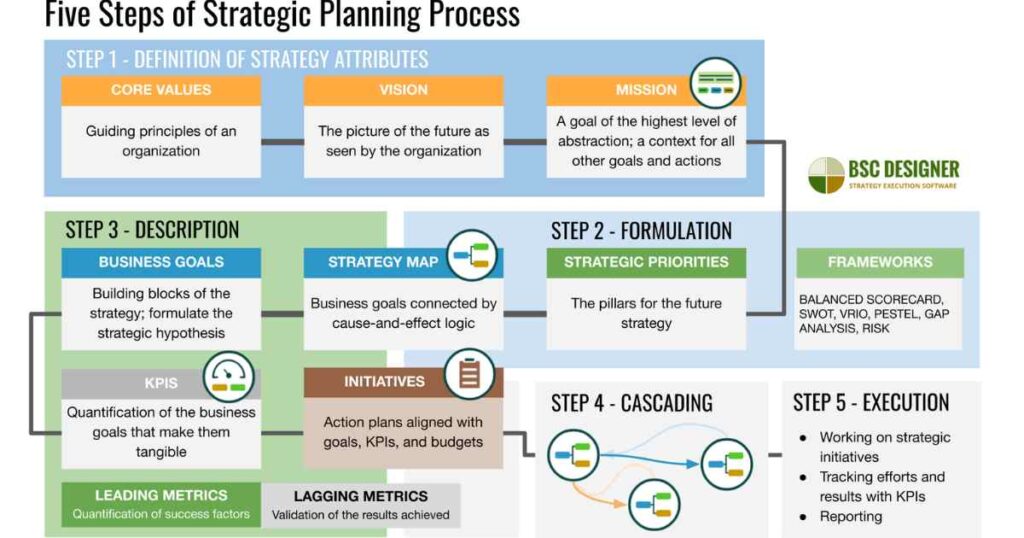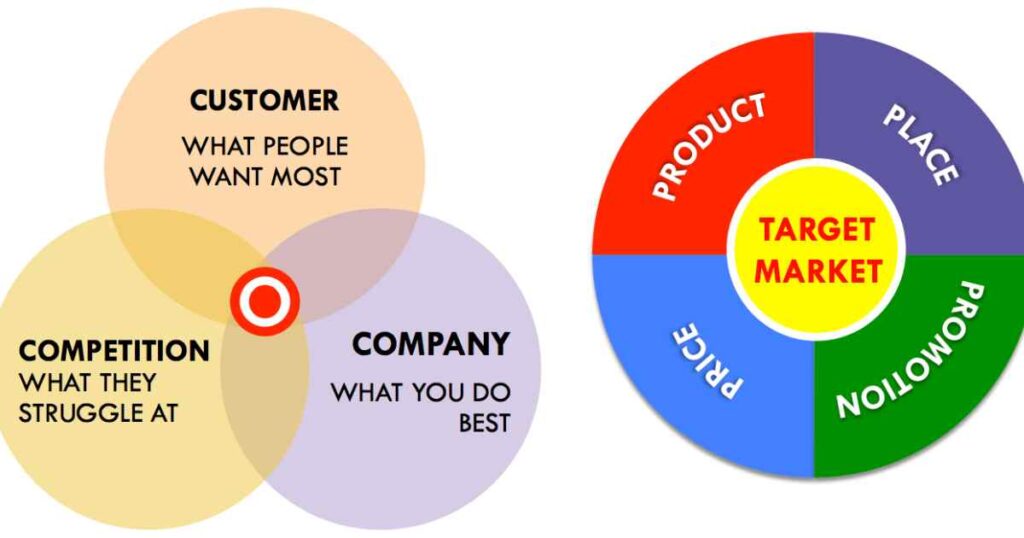What is the Marketing Process?
Marketing is not just about selling products or services; it’s a multifaceted process designed to create, communicate, deliver, and exchange offerings that have value for customers, clients, partners, and society at large.
The marketing process encompasses a series of interconnected steps aimed at achieving specific objectives. It’s a strategic approach that involves understanding consumer needs, creating valuable offerings, promoting them effectively, and building strong relationships with customers.
What Are the 4 Major Components of Marketing?
Understanding Customer Needs:
This is the foundational step in the marketing process. It involves conducting market research, gathering data, and analysing consumer behaviour to gain insights into their preferences, desires, and pain points. By understanding what customers want and need, businesses can tailor their offerings to meet those requirements effectively.
Creating Value Propositions
Once customer needs are identified, the next step is to develop value propositions that address those needs. A value proposition is a promise of value to be delivered and a belief from the customer that value will be experienced. It’s about offering products or services that provide tangible benefits and solve specific problems for customers.
Delivering Customer Value
This component focuses on delivering the promised value to customers through product development, pricing strategies, distribution channels, and customer service. It’s about ensuring that customers receive high-quality products or services in a timely manner and have a positive experience throughout their interaction with the brand.
Building Customer Relationships
In today’s competitive marketplace, building strong and lasting relationships with customers is crucial for business success. This component involves engaging with customers through various channels, such as social media, email marketing, and customer feedback mechanisms. By fostering meaningful connections with customers, businesses can enhance loyalty, drive repeat purchases, and generate positive word-of-mouth.
What Are the Parts of the Marketing Process?

The marketing process comprises several interconnected parts, each playing a crucial role in achieving marketing objectives:
Market Analysis
This involves researching and analysing market trends, consumer demographics, competitive landscape, and other factors that impact the demand for a product or service. Market analysis helps businesses identify opportunities and challenges in the marketplace.
Strategic Planning
Based on market analysis, businesses develop marketing strategies and plans to achieve their objectives. Strategic planning involves setting goals, defining target markets, allocating resources, and establishing metrics to measure success.
Product Development
This part of the process focuses on creating and refining products or services that meet the needs and preferences of target customers. It involves designing, testing, and launching new offerings while continuously innovating to stay ahead of competitors.
Promotion and Advertising
Once products or services are developed, businesses need to promote them effectively to reach their target audience. Promotion and advertising strategies may include traditional advertising, digital marketing, content marketing, public relations, and other tactics to raise awareness and generate interest.
Distribution and Sales
Distribution channels play a vital role in delivering products or services to customers efficiently. Businesses must select the right distribution channels, such as direct sales, retail stores, e-commerce platforms, or wholesalers, to ensure widespread availability and accessibility.
Customer Relationship Management (CRM)
Building and maintaining strong relationships with customers is essential for long-term success. CRM involves managing customer interactions, tracking preferences, resolving issues, and rewarding loyalty to enhance customer satisfaction and retention.
Evaluation and Feedback
Continuous evaluation and feedback are integral parts of the marketing process. Businesses need to monitor the performance of their marketing efforts, gather feedback from customers, and adjust their strategies accordingly to stay competitive and relevant in the marketplace.
What Are the 4 C’s of Marketing?

The 4 C’s of marketing is a customer-centric framework that focuses on the needs and preferences of consumers. Unlike the traditional 4 P’s (product, price, place, promotion), which are more product-centric, the 4 C’s shift the focus to the customer’s perspective:
Customer Needs and Wants
Instead of starting with the product, marketers begin by understanding customer needs and wants. By identifying what customers value and desire, businesses can tailor their offerings to meet those requirements effectively.
Cost to the Customer
This refers to more than just the price of the product; it encompasses all costs associated with acquiring and using the product or service, including time, effort, and inconvenience. Businesses need to consider the total cost to the customer and ensure that the perceived value outweighs the cost.
Convenience:
Convenience is key in today’s fast-paced world. Customers value products and services that are easily accessible, available when and where they need them, and simple to use. Marketers need to make purchasing and using their offerings as convenient as possible to satisfy customer needs.
Communication
Effective communication is essential for building strong relationships with customers. Marketers need to communicate clearly and persuasively, conveying the benefits and value of their products or services in a way that resonates with the target audience.
By focusing on the 4 C’s of marketing, businesses can better understand and meet the needs of their customers, ultimately driving long-term success and profitability.
Frequently Asked Questions
What is marketing decoding?
Marketing decoding involves breaking down the intricate processes and components of marketing strategies to better understand their significance and impact on consumer behaviour.
What are the key components of the marketing process?
The key components include market research, target audience identification, product/service development, pricing strategies, promotion tactics, and distribution channels.
Why is understanding the marketing process important?
Understanding the marketing process is crucial for businesses to effectively reach their target audience, create demand for their products/services, differentiate themselves from competitors, and ultimately drive sales and revenue.
How does market research fit into the marketing process?
Market research helps businesses gather valuable insights into consumer preferences, behaviours, and market trends, enabling them to make informed decisions throughout the marketing process, from product development to promotional strategies.
What role does promotion play in the marketing process?
Promotion encompasses various tactics such as advertising, public relations, sales promotions, and digital marketing, all aimed at raising awareness, generating interest, and ultimately persuading consumers to purchase a product/service. Understanding how to effectively promote offerings is essential for successful marketing campaigns.
Conclusion
In conclusion, the marketing process is a comprehensive framework that encompasses various components, including understanding customer needs, creating value propositions, delivering customer value, and building customer relationships.
By following these steps and embracing customer-centric principles such as the 4 C’s of marketing, businesses can develop effective marketing strategies, drive customer engagement, and achieve their objectives in today’s competitive marketplace.








